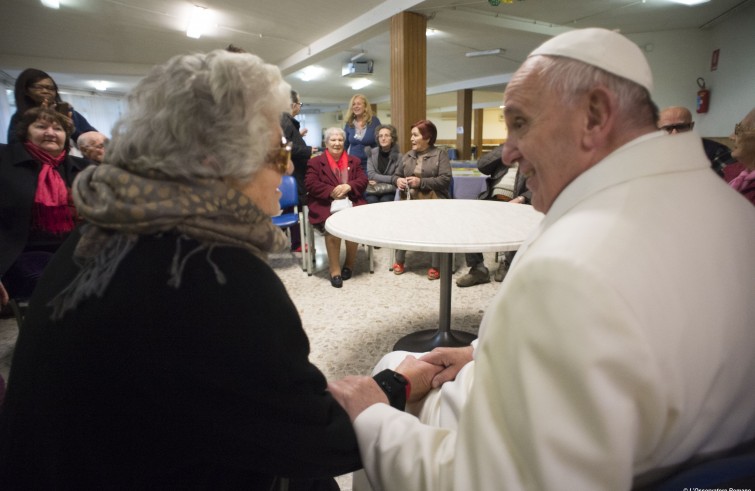Reflection
The sense of sight relates to a category preferred by Francis, repeated on many occasions but perhaps in a reductive form. It refers to the peripheries. The sense of hearing “conveys” the style of Bergoglio, that is, synodality . Taste is the gift of joy that dwells in our hearts when we welcome his Gospel ( Evangelii gaudium ). Smell can penetrate the depths of the relationship, into our inner sphere (“shepherds with the odour of the sheep”). Touch must be viewed against an anthropological and spiritual background. Francis commences addressing it in a Christological sense (“touching the flesh of Christ”) ultimately concluding with the love for our neighbour. Here, then, are the five spiritual senses that enable the Church to be a Church with “sound senses”, that is also a Church to be savoured!

“The senses help us to grasp reality and at the same time to situate ourselves in reality. Not by chance did Saint Ignatius appeal to the senses for the contemplation of the mysteries of Christ and truth.” I will use this expression, pronounced by Francis in his address to the Roman Curia on December 21, 2017, to quickly retrace his Petrine ministry in the five years that have passed since the evening of that 13th of March, when his election was announced urbi et orbi. The Pope was obviously not giving a lesson in philosophy; however, he intended to highlight the points he was expounding about the duty in the Curia to care for its extroversion, that is, its relationship “with the outside world”, with two specific references. The first is to common knowledge, remembered in the centuries-old axiom that our knowledge is occasioned by our senses: St. Thomas mentioned it in his De veritate and even St. Bonaventure affirmed that the senses allow us to experience reality directly, in the immediacy of its here and now ( In III Sent. ). The other reference involved his personal spiritual formation, conveyed with the following words: “Not by chance did Saint Ignatius appeal to the senses for the contemplation of the mysteries of Christ and truth.”
Thus it is our senses, starting with the external ones, that enable the human person to perceive reality, set against the backdrop of the Catholic doctrine on spiritual senses, of which Ignatius of Loyola is among the great masters. In fact, reading the Exercises we immediately come across this statement: “It is not great knowledge that fulfils and satisfies the soul, but feeling and tasting things inwardly” (2, 4). This theology has a distinguished representative in J.-J. Surin . However, it is very ancient. Origen illustrated the spiritual potential of the senses by writing that the sight can illuminate higher realities; through hearing we perceive sounds that are not present; taste enables us to savour the living bread descended from the sky, and the sense of smell makes us aware of perfumes that are, according to St. Paul, the Aroma of Christ; finally touch – whereby John affirms that he touched with his hands the Word of life (cf. Against Celsus 1: 48). In the Latin cultural area St. Augustine said: “Nor need you wonder that the ineffable knowledge of God, whereby He is cognizant of all things, is, because of the various modes of human speech designated by the names of all those bodily senses; since even our own mind, in other words, the inner man,—to which, while itself exercising its knowing faculty in one uniform way, the different subjects of its knowledge are communicated by those five messengers, as it were, of the body, when it understands, chooses, and loves the unchangeable truth,—is said both to see the light, whereof it is said, That was the true light; and to hear the word, whereof it is said, In the beginning was the Word (Jn 1:91) and to be susceptible of smell, of which it is said, We will run after the smell of thy ointments (Ct 1:3) and to drink of the fountain, whereof it is said, With Thee is the fountain of life; (Ps 35:10) and to enjoy the sense of touch, when it is said, But it is good for me to cleave unto God (Ps 72: 28) in all of which it is not different things, but the one intelligence, that is expressed by the names of so many senses” ( Tractates on the Gospel According to John 99: 4).

Sight
Let’s start, then, with the sense of sight , which is generally mentioned first. In the language of Francis the term “gaze” recurs many times and it has, among other things, a very personal reverberation. For example, in the homily in Santa Marta on 21 September 2013 (the liturgical feast of St. Matthew, which for the Pope has a special resonance because it refers to the choice of life) the Holy Father speaks of the gaze of Jesus, a life-changing gaze that makes us worthy and gives us dignity. I would like to apply the sense of sight to a category preferred by Francis, repeated on many occasions but perhaps in a reductive form. It relates to the peripheries. I once asked him what he meant exactly with that term. Francis replied: “It is a hermeneutical principle; a way of looking at reality”; he explained it by saying that when having reached the end of the American continent, Magellan looked towards Europe and he realized that it was quite different compared to the one gazed at from the centre of Madrid! Bergoglio spoke of “peripheries” already on May 26, 2013, during his first pastoral visit to a parish in Rome. Responding to the welcoming remarks of the parish priest, he said: “I like what you said: that the word “outskirts” has a negative connotation but also a positive one. Do you know why? Because we understand reality better from the outskirts not the centre. We understand it better.” Peripheries, therefore, is a way of looking at the world and, for the Church, it is a way of being in the contemporary world (cf. Gaudium et spes 1).

Hearing
For hearing it is indeed the case to take an excerpt from what is one of Francis’ most significant speeches in terms of the understanding of his style of government, namely synodality . I refer to his speech of 17 October 2015 when, commemorating the 50th anniversary of the institution of the Synod of Bishops, he said: “A synodal Church is a Church which listens, which realizes that listening “is more than simply hearing”. It is a mutual listening in which everyone has something to learn. The faithful people, the college of bishops, the Bishop of Rome: all listening to each other, and all listening to the Holy Spirit, the “Spirit of truth” (Jn 14:17), in order to know what he “says to the Churches” (Rev 2:7).” It seems to me that this statement is somewhat provocative especially for those who believe that the first thing should be to have a voice: obviously, their own voice! Listening, however, is precisely the first attitude, taught to us by the Council in Dei Verbum: to listen to the Word of God, at least. Speaking of synodality , the Pope once said: “when people are afraid to listen, they do not have the Spirit in their heart.” ( Homily in Santa Marta, April 28 2016). Above all it is important to “listen with humility.” The form of mutual listening that Francis refers to is rooted first and foremost in what the Spirit says to the Churches; but it is also a call to that discernment that is dear to him, exemplified when he says that today the Church needs to grow in her ability of spiritual discernment (30 July 2016, to a group of Polish Jesuits).

Taste
Let us now delve into the sense of taste . “Taste and see how good the Lord is”, recites a psalm (34:9) and, St. Augustine commented, may all those who taste his sweetness rejoice (cf. Enarr . in Ps 5: 15-16). Last Tuesday, February 27, while concelebrating the Holy Mass, as the session of the Council of Cardinals was under way, my thoughts immediately went to the spiritual significance of taste when I heard Francis commenting on the Gospel passage, explaining how Jesus appeals to our conversion: “This is how the Lord calls us: ‘Come on, let’s have a coffee together. Let’s talk this over, let’s discuss it. Don’t be afraid, I’m not going to beat you. “… Hey you, Zacchaeus come down! Come down, come with me, let’s have lunch together!”. The taste of the Lord is the gift of joy that settles in our hearts when we welcome his Gospel. We all know the opening words of the exhortation Evangelii gaudium: “The joy of the gospel fills the hearts and lives of all who encounter Jesus. Those who accept his offer of salvation are set free from sin, sorrow, inner emptiness and loneliness. With Christ joy is constantly born anew.” The joy referred to here is a feeling and it is conspicuous; it is in fact even more than that because it is a gift of the Spirit; it is a sign of our embrace of Jesus and of his Gospel: “I have told you this so that my joy may be in you and that your joy may be complete.” ( Jn. 15: 11). Once the Pope added that “joy is the sign of the Christian: “a Christian without joy either is not a Christian or he is sick…a Christian without joy is not Christian” ( Homily in Santa Marta of 22 May 2014). In a previous homily on a workday (May 10 2013) he spoke of joy as “a pilgrim virtue, a gift that moves Christians to journey out into the world preaching the Gospel and proclaiming Christ, that broadens and extends our journey…”. He also talked about “disheartened Christians, with a sour face like pickled peppers”: an expression repeated several times (see the Audience of August 23 2017: “Am I a person of the Spring or of Autumn?”. Of Springtime, which expects flowers, which expects fruit, which expects the sun that is Jesus; or of Autumn, which is always with the face looking down, disheartened and, as I have said at times, with a sour face like pickled peppers.”). The image is linked to the sense of taste, but it is not very tasty! The opposite is found in Amoris laetitia , where the reference to the sense of taste is truly positive: “The most intense joys in life arise when we are able to elicit joy in others, as a foretaste of heaven. We can think of the lovely scene in the film Babette’s Feast, when the generous cook receives a grateful hug and praise: “Ah, how you will delight the angels!” It is a joy and a great consolation to bring delight to others, to see them enjoying themselves. This joy, the fruit of fraternal love, is not that of the vain and self-centred, but of lovers who delight in the good of those whom they love, who give freely to them and thus bear good fruit.” (No. 129). I previously mentioned two Council constitutions. Why not add a reference to the Sacred Liturgy? In fact, this is the privileged place where the Christian learns and lives the taste of God and of fraternity: “How sweet it is for the brothers to live together”, reads the Psalm (133: 1).

Smell
Smell is the fourth of the external senses. It bears equal importance, for it is able to communicate to us what the other senses cannot: it does not touch and does not see, it does not listen or taste, but it cautions, it recognizes and manages to distinguish what is impersonal from what is truly personal and unique. The sense of smell is able to penetrate into the depths of the relationship, in our inner sphere. The Pope recalled this sense in the homily of the first Chrism Mass in Saint Peter’s on March 28, 2013. He spoke to the priests and asked them to be “shepherds with the odour of the sheep.” The same interpretation was given by Francis himself a few weeks later, meeting the new bishops at the end of a period of formation on September 19, 2013. Here are some passages from the speech: “In the Homily in the Chrism Mass this year I said that Pastors must have “the odour of sheep”. Be Pastors with the odour of the sheep, present in your people’s midst like Jesus, the Good Shepherd. Your presence is not secondary, it is indispensable. Presence! The people themselves who want to see their bishop walk with them and be near them ask it of you. They need his presence in order to live and breathe! […]A pastoral presence means walking with the People of God, walking in front of them, showing them the way, showing them the path; walking in their midst, to strengthen them in unity; walking behind them, to make sure no one gets left behind but especially, never to lose the scent of the People of God in order to find new roads.” Thus the sense of smell, that the Pope refers to is therefore the sensus fidei that we read of in the dogmatic constitution on the Church of Vatican II (cf.Lumen gentium n. 12). Yet another constitution of the Council! In this case it is not simply a question of recalling Catholic doctrine on a fundamental theme of the Council, it is also the presentation of a model for relations between the faithful and sacred pastors. In other words, the reference is again to synodality. In fact, in the above-mentioned speech of October 17, 2015, the Pope said: “In the Apostolic Exhortation Evangelii Gaudium, I emphasized that “the people of God is holy thanks to this anointing, which makes it infallible in credendo”, and added that “all the baptized, whatever their position in the Church or their level of instruction in the faith, are agents of evangelization, and it would be insufficient to envisage a plan of evangelization to be carried out by professionals while the rest of the faithful would simply be passive recipients”. The sensus fidei prevents a rigid separation between an Ecclesia docens and an Ecclesia discens, since the flock likewise has an instinctive ability to discern the new ways that the Lord is revealing to the Church.”

Touch
In the list of external senses touch is generally the last one mentioned; St. Thomas, however, referred to it as the first and noted that, although among others it is the most carnal, touch was indicated by Christ as the sense that more than others would have given the doubting apostle the certainty of the truth of the Resurrection (cf. Super Sent. III; Jn 20: 27). For St. Bonaventure of all the senses touch is the one that most binds us together: in fact, it is the uttermost realization of the contact between two persons and thus expresses Christian love, which is the most unifying of all the theological virtues. When we love we are not content with seeing and looking, we are inclined to touch. For those who love it is not enough to hear, for every voice is an appeal to break the wall of distance, an invocation to embrace. Love always wants to touch. Every beloved face calls for a hand and each hand reaches out to the beloved face.
Francesco’s use of the verb to touch must also be read against this anthropological backdrop that is also one of spiritual theology. He starts by mentioning it in its Christological sense (“touching the flesh of Christ”), ultimately concluding with the love for our neighbour. A clear example is found in some passages of his address during the Pentecost Vigil of May 18, 2013. Listening to his living voice allows us to perceive the Pope’s spirit: “We must become courageous Christians and go in search of the people who are the very flesh of Christ, those who are the flesh of Christ! When I go to hear confessions – I still can’t, because to go out to hear confessions… from here it’s impossible to go out, but that’s another problem — when I used to go to hear confessions in my previous diocese, people would come to me and I would always ask them: “Do you give alms?” — “Yes, Father!” “Very good.” And I would ask them two further questions: “Tell me, when you give alms, do you look the person in the eye?” “Oh I don’t know, I haven’t really thought about it”. The second question: “And when you give alms, do you touch the hand of the person you are giving them to or do you toss the coin at him or her?” This is the problem: the flesh of Christ, touching the flesh of Christ, taking upon ourselves this suffering for the poor. Poverty for us Christians is not a sociological, philosophical or cultural category, no. It is theological. I might say this is the first category, because our God, the Son of God, abased himself, he made himself poor to walk along the road with us. This is our poverty: the poverty of the flesh of Christ, the poverty that brought the Son of God to us through his Incarnation. A poor Church for the poor begins by reaching out to the flesh of Christ.”
Here, then, are the five spiritual senses that enable the Church to be a Church with “sound senses”, that is also a Church to be savoured!
(*) bishop of Albano, secretary of the C9